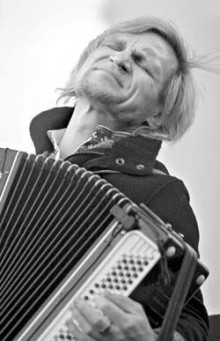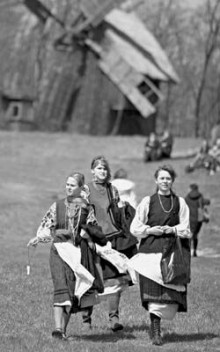Since heathen times hayivkas spring games have been played to herald the warming of the weather and spring sunshine. Our ancestors danced and sang loud songs, thus conveying their energy to nature, so as to wake up all living things after the winter sleep. Oleh Skrypka, leader of the group VV, invited everybody to uphold this tradition at the Museum of Folk Architecture and Daily Life in Pyrohovo.
Hayivkas combine songs, dances, and pantomimes. Hayivkas are part of folk rituals with round dances and games meant to summon spring and ensure good harvests. Heathens performed such rituals round sacred hai groves — hence the name hayivka. Sashko Lirnyk, a noted taleteller and regular participant in folk festivities, told The Day that since olden times special songs were performed during hayivkas that actually marked the beginning of the ritual. “Hayivkas are true folk celebrations. People would should, ‘Come, spring!’ The louder the better. They danced, sang, and told tales, each doing something he could do best. Naturally, these traditions have changed considerably with time, but it’s good to know the basic ones.”
Hayivkas initiated by Oleh Skrypka could be described as a rehearsal of the well-known ethnic fest “Countries of Dreams” which is annually held in July and is also the VV frontman’s brainchild. A number of people gathered at the open air museum, although the weather was rather cold. All could watch craftsmen at work and learn to make rug dolls of even blacksmith’s skills. Quite a few joined in round dances and songs that in a way combined folk rites. Hayivkas were harmoniously followed by the ethnic groups Buttia, Volodar, Hurtopravtsi, Choboty z buhaia, and Ukrainian romances performed by the maestro Skrypka.
Folk celebrations organized by Oleh Skrypka are interesting primarily by attracting very large audiences, both young and old (mostly young, though). This time among the hayivka viewers were a number of foreigners who obviously admired what they were watching. All agree that such events radiate some special energy. “Hayivkas are excellent occasions on which to relax and forget about politics,” Sashko Lirnyk points out happily, “they are just great, with so many familiar faces, with everybody smiling.
Here you can join a festive table, eat, drink, and sing to your heart’s content. Strangers greet each other and make friends. Here all people feel at home, like a family... Hayivkas in Kyiv allow people to feel Ukrainian. Some perceive our culture through folk rites, others through concerts, still others want to listen to tales or see something new. It’s like adding brick after brick to a structure...”









